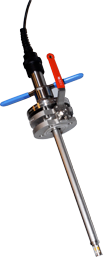On-line measurements often present extra challenges, especially when routine maintenance is required. The PR10 is ideally suitable for applications where the sensors must be removed without interrupting or shutting down the process. Without any special tools the PR10 can be retracted safely from the process at pressures up to 5 bar (72 psi). The PR10 is a universal retractable assembly that can be used for all liquid measurements. The PR10 is designed to accept any commercially available pH/ORP or dissolved oxygen sensor that has a PG13.5 connection while still being backwards compatible with old Yokogawa electrodes.
For ease of use, optional flush ports are available. In the retracted position the sensor can be kept moist, cleaned or even calibrated. This can all be done without process interruption or disassembly of the armature.
- One model for pH/ORP, dissolved oxygen, conductivity and inductive conductivity sensors
- All commercially available pH electrodes, such as PG13.5, SMART sensors, Vario Pin, YEF and DIN connectors can be installed in the PR10.
- Integrated protection cage
- A "scraper" is built-in to each assembly to effectively scrape or wipe off the
process from the PR10's shaft as it is being retracted from the process. - A safe "through the valve" insertion and retraction design
- Simplified installation by optional ball valves with flanged or tapered connections
- Optional flush port accessories makes it easy to keep sensors moist (pH) and clean, and also provides access for calibration if desired.
Refer to >> Process Liquid Analyzer Sensor Wiring Guide
Recursos
For control of batch neutralization, a pH measurement coupled with a timer-controlled chemical feed scheme provides very satisfactory results.
This system can be adapted for either acid waste or alkaline waste neutralization.
Wet scrubbers are used in utilities, paper mills, and chemical plants to remove sulfur dioxide (SO2) and other pollutants from gas streams. Undesirable pollutants are removed by contacting the gases with an aqueous solution or slurry containing a sorbent. The most common sorbents are lime, Ca(OH)2, and limestone, CaCO3.
Process liquid analyzers such as pH meters, conductivity meters, ORP meters, and density meters play an important role at electrolysis plants in the control of concentrations of various process solutions. This requires both precision and stability under harsh conditions that include highly corrosive substances, high temperatures, and many impurities.
In the past, the boiler feed tank systems in sugar factories had to be checked several times a day to make sure there were no sugar solution leaks. This was a very laborious process and, as continuous monitoring was not possible, monitoring results were not reliable. When a leak occurred, recovery operations were very costly and time-consuming. (AN10D01K01-02E)
Power plant boiler houses designed to burn coal or high sulfur oil are required by Federal and State pollution regulations to "scrub" (remove) sulfur dioxide from flue gasses to meet emission limits. SO2 in flue gasses is known to be harmful to the environment, as it is one contributor to the formation of acid rain. pH control is critical for the proper functioning of the scrubber system.
Current trend for increasing mercury awareness throughout the public sector has caused the government to take action. Recently, the Environmental Protection Agency (EPA) has focused their efforts on controlling mercury levels produced in various coal fired power plants. Based on information from several case studies, the EPA developed the Mercury and Air Toxics Standards to cut back mercury emissions. The most popular technology utilized by coal plants to meet the new standards is a scrubber which cleans the off gas from the combustion process. ORP sensors can further monitor the effluent from these scrubbers to ensure optimal mercury emission levels are achieved. By closely monitoring the mercury concentrations in the effluent, plant managers will be able to easily confirm their plants are meeting the EPA's standards.
Descargas
Manuales
Información Técnica
Certificados
¿En busca de información adicional sobre Yokogawa Iberia, tecnología y soluciones?
Contáctenos








